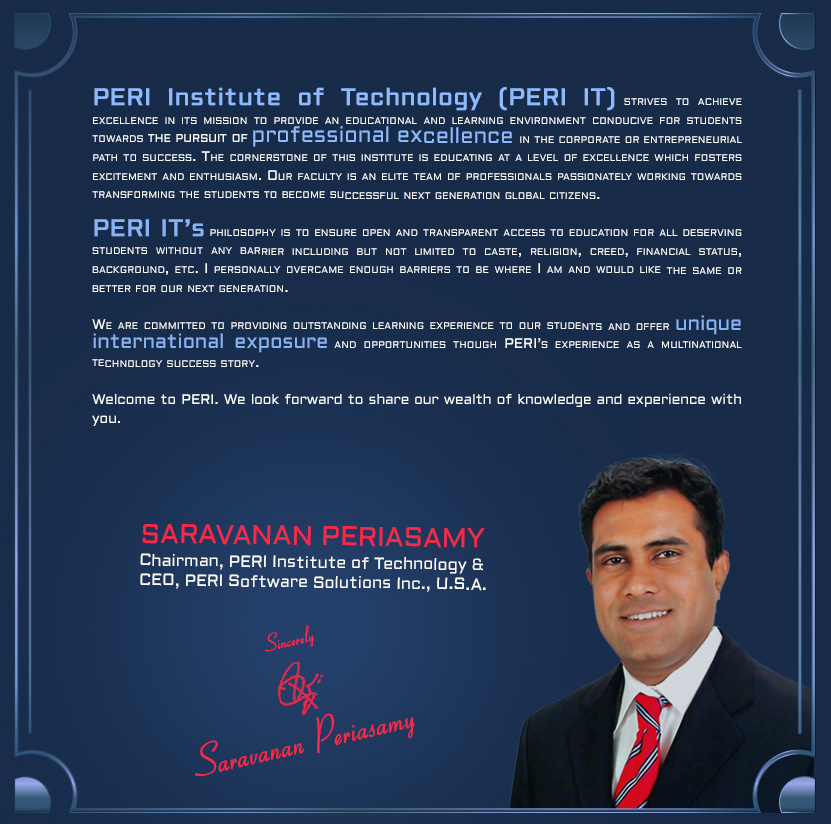M.E. Power Electronics and Drives

Power Electronics and Drives is a specialized area of Electrical and Electronics Engineering involving the control and conversion of electric power using solid-state techniques. The students are exposed to various areas including advanced power semiconductor devices, Artificial Intelligence (AI) techniques, fuzzy logic, artificial neural networks, analysis of power converters and inverters, solid state ac drives and dc drives, computer aided design of electrical machines, modern rectifiers and resonant converters, flexible ac transmission systems, wind energy conversion systems, power quality etc. The students will also be exposed to various simulation packages like MATLAB/SIMULINK, PSIM/ORCAD, MAGNET, PSCAD etc.
Graduates of this degree have numerous career opportunities in various sectors with the power sector being the principal employer. A recent estimate suggested that over 40% of all electric power generated utilizes power electronics and this is expected to only increase in the future, leading to a growing demand for power engineers. Numerous job profiles are also available abroad in hardware manufacturing firms and power industry.
Course Syllabus
PERI IT follows the Anna University syllabus for affiliated colleges. Click on the appropriate semester to view the syllabus. The complete syllabus can be downloaded here.
| SL. No. | Course Code | Course Title | L | T | P | C |
|---|---|---|---|---|---|---|
| THEORY | ||||||
| 1 | MA7163 | Applied Mathematics for Electrical Engineers | 3 | 1 | 0 | 4 |
| 2 | PX7101 | Analysis of Electrical Machines | 3 | 0 | 0 | 3 |
| 3 | PX7102 | Analysis of Power Converters | 3 | 0 | 0 | 3 |
| 4 | PX7103 | Analysis and Design of Inverters | 3 | 0 | 0 | 3 |
| 5 | PX7104 | Advanced Power Semiconductor Devices | 3 | 0 | 0 | 3 |
| 6 | Elective I | 3 | 0 | 0 | 3 | |
| TOTAL | 18 | 1 | 0 | 19 | ||
| SL. No. | Course Code | Course Title | L | T | P | C |
|---|---|---|---|---|---|---|
| THEORY | ||||||
| 1 | PX7201 | Solid State DC Drives | 3 | 0 | 0 | 3 |
| 2 | PX7202 | Solid State AC Drives | 3 | 0 | 0 | 3 |
| 3 | PX7203 | Special Electrical Machines | 3 | 0 | 0 | 3 |
| 4 | PX7204 | Power Quality | 3 | 0 | 0 | 3 |
| 5 | Elective II | 3 | 0 | 0 | 3 | |
| 6 | Elective III | 3 | 0 | 0 | 3 | |
| PRACTICAL | ||||||
| 7 | PX7211 | Power Electronics and Drives Lab | 0 | 0 | 3 | 2 |
| TOTAL | 18 | 0 | 3 | 20 | ||
| SL. No. | Course Code | Course Title | L | T | P | C |
|---|---|---|---|---|---|---|
| THEORY | ||||||
| 1 | PX7301 | Power Electronics for Renewable Energy Systems | 3 | 0 | 0 | 3 |
| 2 | Elective IV | 3 | 0 | 0 | 3 | |
| 3 | Elective V | 3 | 0 | 0 | 3 | |
| PRACTICAL | ||||||
| 4 | PX7311 | Project Work (Phase I) | 0 | 0 | 12 | 6 |
| TOTAL | 9 | 0 | 12 | 15 | ||
| SL. No. | Course Code | Course Title | L | T | P | C |
|---|---|---|---|---|---|---|
| PRACTICAL | ||||||
| 1 | PX7411 | Project Work ( Phase II) | 0 | 0 | 24 | 12 |
| TOTAL | 0 | 0 | 24 | 12 | ||
| SL. No. | Course Code | Course Title | L | T | P | C |
|---|---|---|---|---|---|---|
| ELECTIVE I | ||||||
| 1 | CL7103 | System Theory | 3 | 0 | 0 | 3 |
| 2 | ET7102 | Microcontroller Based System Design | 3 | 0 | 0 | 3 |
| 3 | PX7001 | Electromagnetic Field Computation and Modelling | 3 | 0 | 0 | 3 |
| ELECTIVE II & III | ||||||
| 4 | CL7204 | Soft Computing Techniques | 3 | 0 | 0 | 3 |
| 5 | EB7212 | Digital Simulation of Power Electronic Circuits Laboratory | 3 | 0 | 0 | 3 |
| 6 | ET7201 | VLSI Architecture and Design Methodologies | 3 | 0 | 0 | 3 |
| 7 | PS7202 | Flexible AC Transmission Systems | 3 | 0 | 0 | 3 |
| 8 | PS7002 | Energy Management and Auditing | 3 | 0 | 0 | 3 |
| 9 | PX7002 | SMPS and UPS | 3 | 0 | 0 | 3 |
| ELECTIVE IV & V | ||||||
| 10 | PS7005 | High Voltage Direct Current Transmission | 3 | 0 | 0 | 3 |
| 11 | ET7014 | Application of MEMS Technology | 3 | 0 | 0 | 3 |
| 12 | PS7004 | Solar and Energy Storage Systems | 3 | 0 | 0 | 3 |
| 13 | PS7007 | Wind Energy Conversion Systems | 3 | 0 | 0 | 3 |
| 14 | PX7003 | Non Linear Dynamics for Power Electronics Circuits | 3 | 0 | 0 | 3 |
| 15 | PS7008 | Smart Grid | 3 | 0 | 0 | 3 |
Laboratories
Our laboratories are highly modernized to reflect the rapidly changing trends in technology and have all necessary facilities aimed at imparting the best practical knowledge to the students. Some of the laboratories are listed below.
- Electrical Machines Lab
- Power Electronics Lab
- Control Systems Lab
- Measurement and Instrumentation Lab
- Simulation lab including MATLAB/SIMULINK, PSIM/ORCAD, MAGNET, PSCAD
Additional Educative Activities
The department aims to provide quality education and a thorough training in concepts and practical knowledge necessary for a fulfilling career. The students are also provided special training to strengthen their technical and communication skills. The department arranges periodic industrial visits each semester for the students to improve their practical technical knowledge.
The department also conducts periodic guest lectures by professionals from reputed organizations and universities. The students are well taught theoretically and practically to design electrical and electronic circuits. In order to build a more rounded training, the students are encouraged to participate in national and international events.
The Department also hosts an association of Electrical & Electronics Engineering named "Elysian" that was inaugurated on 09 Feb 2012.




